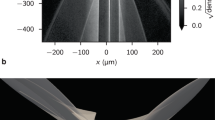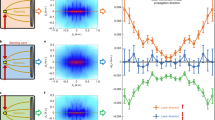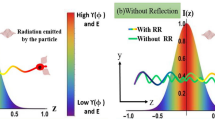Abstract
IN my monograph “Axialität der Lichtemission und Atomstruktur” (Polytechnische Buchhandlung A. Seydel, Berlin, 1927) I have discussed a case of asymmetry of radiation; if atoms of an element, say of helium, pass through a gas such as hydrogen, under certain conditions for some spectral lines of the moving atoms the radiation in the direction opposite to the movement is more intense than in the direction of the moving atoms. This phenomenon is one of the facts on which I have based the conclusion that the atoms of the chemical elements have an axial structure and that the emission of light from a single atom is of vortical structure (Lichtwirbel) (cf. my monograph “Atomstruktur und Atombindung”, Polytechnische Buchhandlung A. Seydel, Berlin, 1928).
This is a preview of subscription content, access via your institution
Access options
Subscribe to this journal
Receive 51 print issues and online access
$199.00 per year
only $3.90 per issue
Buy this article
- Purchase on Springer Link
- Instant access to full article PDF
Prices may be subject to local taxes which are calculated during checkout
Similar content being viewed by others
Author information
Authors and Affiliations
Rights and permissions
About this article
Cite this article
STARK, J. Asymmetry in the Radiation from the Hydrogen Atom in the Electric Field. Nature 124, 125–126 (1929). https://doi.org/10.1038/124125b0
Issue Date:
DOI: https://doi.org/10.1038/124125b0
This article is cited by
Comments
By submitting a comment you agree to abide by our Terms and Community Guidelines. If you find something abusive or that does not comply with our terms or guidelines please flag it as inappropriate.



